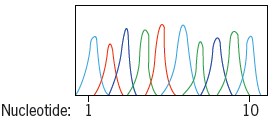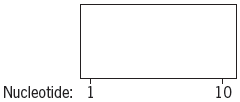Ten micrograms of a decanucleotide-pair HpaI restriction fragment were isolated from the double-stranded DNA chromosome of a
Question:
5€²-X X X X X X X X X X-3€²
3€²-X€² X€² X€² X€² X€² X€² X€² X€² X€² X€²-5€²
†“ terminal transferase, dATP
5€²-X X X X X X X X X X A A A A A A A A-3€²
3€²-A A A A A A A A X€² X€² X€² X€² X€² X€² X€² X€² X€² X€²-5€²
where X and X€² can be any of the four standard nucleotides, but X€² is always complementary to X.
The two complementary strands (€œWatson€ strand and €œCrick€ strand) were then separated and sequenced by the 2€²,3€²-dideoxyribonucleoside triphosphate chain-termination method. The reactions were primed using a synthetic poly(T) octamer; that is, Watson strand
3€²-A A A A A A A A X€² X€² X€² X€² X€² X€² X€² X€² X€² X€²-5€²
5€²-T T T T T T T T-OH
Crick strand
5€²-X X X X X X X X X X A A A A A A A A-3€²
HO-T T T T T T T T-5€²
Two DNA sequencing reactions were carried out.
Reaction 1 contained the Watson strand template/primer shown above; reaction 2 contained the Crick strand template/primer. Both sequencing reactions contained DNA polymerase and all other substrates and components required for DNA synthesis in vitro plus the standard four 2€²,3€²-dideoxyribonucleoside triphosphate chain-terminators€”ddGTP, ddCTP, ddATP, and ddTTP€”each labeled with a different fluorescent dye. The dyes fluoresce at different wavelengths, which are recorded by a photocell as the products of the reactions are separated by capillary gel electrophoresis. In the standard sequencing reaction, the chains terminating with ddG fluoresce dark blue (peaks appear black in the computer printouts), those terminating with ddC fluoresce light blue, those terminating with ddA fluoresce green, and those terminating with ddT fluoresce red. The computer printout for sequencing reaction 1, which contained the Watson strand as template, is shown as follows.

Draw the predicted computer printout for reaction 2, which contained the Crick strand as template, in the following box. Remember that all DNA synthesis occurs in the 5€² †’ 3€² direction and that the sequence of the nascent strand reads 5€² to 3€² from left to right in the printout.

Fantastic news! We've Found the answer you've been seeking!
Step by Step Answer:
Related Book For 

Principles of Genetics
ISBN: 978-1119142287
7th edition
Authors: D. Peter Snustad, Michael J. Simmons
Question Posted:





